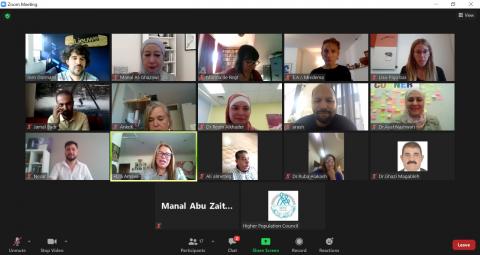

The Higher Population Council launched today, Monday, the event for the “Towards More Sustainable Services and Solutions for Sexual and Reproductive Health Needs and Reproductive Rights for Refugee Youth in Jordan” Program, in participation with VRIJE University in Amsterdam, the Dutch Academy Belink, the Royal Tropical Institute in Holland, the Jordanian association Ahel AlJabal and Yarmouk University.
The Higher Population Council’s Secretary General Abla Amawi explained that the most important goals of the project are represented by designing a single approach, on the basis of international standards, to carry out and organize efforts in a more structured manner. This is to solve issues related to sexual and reproductive health more effectively and efficiently with a special focus on more fragile communities in Jordan, to better cooperation between the main stakeholders (governmental organizations, knowledge institutions and community organizations) and to better the knowledge and skills of trainers on the concepts of sexual and reproductive health and equality between the sexes, through establishing a joint academy to train in sexual and reproductive health and rights with a focus on gender and human rights.
Amawi also showed the logical framework and approach the Higher Population Council adopts in providing access to efficient reproductive health services, through the Systems Approach of the Change Management Theory to achieve the effects and results through adopting four paths within the knowledge creation, management and sharing strategy and translating it into applicable practices.
She also explained that the most important challenges Jordan faces in the area of sexual and reproductive health are represented by the presence of wrong societal beliefs on these issues and which generates harmful positions and behaviors that constitute a societal problem, the absence of guides and national training guidance among international criteria and a shortage in the number of specialist trainers in the area of sexual and reproductive health, the limited distribution of qualified human resources in health and non-health sectors which impedes the provision of high-quality services and information in the areas of sexual and reproductive health and fundamental reproductive rights specially those related to youth, the limitations in awareness-raising activities which involve the participation of the community and its engagement and the inequality between the sexes. This is as we all as the fact that not all current awareness-raising activities in Jordan are comprehensive and specialized in raising the level of awareness of teenagers and youth on the issue of sexual and reproductive health and they do not take into consideration the special needs of specific age groups within the youth cohort and lacks in-depth coverage of these issues.
On her part, the Senior Researcher at the Higher Population Council Manal Al Ghazawi said that the achievement of the project’s objectives will be through the harmonization between the inputs and outputs of training and education, the national vision and the interventions of sexual and reproductive health at levels of society; designing a single approach on the basis of international standards, to carry out and coordinate efforts in a more organized manner to solve issues related to sexual and reproductive health more effectively and efficiently; an official partnership between a related governmental organization, a knowledge organization and a community organization to solve these issues on both a regional and societal level all around Jordan; investing in our staff’s development to enable them to develop and carry out effective interventions on these issues and establishing an academy to train in sexual and reproductive health to provide approved training courses in this area for health practitioners and workers in society.







